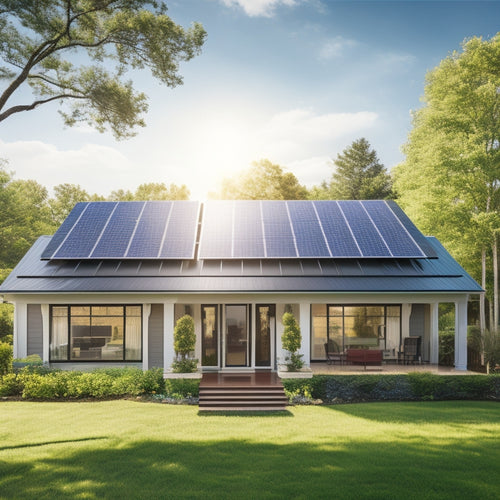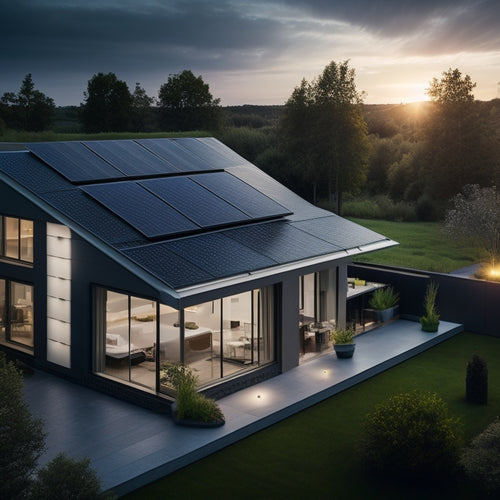
7 Keys to Home Energy Independence
Share
You're taking a significant step towards breaking free from utility companies by exploring the 7 keys to home energy independence. By utilizing solar power potential, you'll reduce your carbon footprint and utility bills. Efficient energy storage systems will provide reliable backup power, while optimizing roof space usage and selecting high-efficiency panels will maximize energy production. Minimizing energy dependence through conservation and alternative energy sources will further reduce your reliance on the grid. Monitoring energy production will identify areas for improvement, and achieving grid freedom will give you full control over your energy management. As you take these essential steps, you'll unleash the full potential of home energy independence.
Overview
- Invest in high-efficiency solar panels and energy storage systems to reduce reliance on the grid and utility bills.
- Implement energy conservation tips, such as sealing air leaks and upgrading appliances, to minimize energy consumption.
- Install a monitoring system to track energy production and consumption in real-time, identifying areas for improvement.
- Integrate renewable energy sources, like solar and wind power, with energy storage solutions to achieve autonomy.
- Design a well-planned off-grid system, considering factors like roof space, shading, and local regulations, to ensure energy independence.
Harnessing Solar Power Potential
Tapping into the abundant energy of the sun, you can greatly reduce your reliance on the grid and lower your utility bills. By adopting off-grid solar battery systems, you can reduce carbon footprint and mitigate climate change.
Staying up-to-date with the latest solar energy trends and solar technology advancements can help you make informed decisions about utilizing solar power. Community solar initiatives and solar installation incentives can make solar energy more accessible and affordable.
However, it's crucial to debunk common solar energy myths and understand the importance of regular solar panel maintenance. With various solar financing options available, you can overcome financial barriers.
Additionally, familiarizing yourself with solar power regulations can guarantee a smooth shift to solar energy. By utilizing the power of the sun, you can take a significant step towards home energy independence.
Efficient Energy Storage Systems
You've successfully captured solar power, but now you need to store that energy for later use.
To power your home independently, you'll require an efficient energy storage system that can provide a reliable backup when the sun isn't shining.
With systems like Tesla Powerwall offering up to 12.8 kWh storage, you can capture excess renewable energy for later use.
Your options include advanced battery technologies that can provide a seamless backup power supply, ensuring your home remains powered during outages or periods of low solar energy production.
Powering Your Home
Powering Your Home (Efficient Energy Storage Systems)
Several key components come together to power your home efficiently, and efficient energy storage systems are at the forefront of this effort. Advanced battery systems detect and store excess energy from renewable sources advanced battery systems, allowing you to utilize the power of wind energy and geothermal heating.
You'll want to contemplate integrating renewable energy sources like wind energy and geothermal heating into your system. Conducting energy audits will help identify areas for improvement, and smart home technology can optimize energy use.
Take advantage of renewable incentives to offset the cost of energy efficient appliances and upgrades. With demand response systems, you can adjust energy usage in real-time.
If you're contemplating electric vehicles, factor in the impact on your energy consumption. By prioritizing energy conservation, you'll reduce your reliance on the grid and move closer to home energy independence.
Battery Backup Options
As you work towards home energy independence, efficient energy storage systems become essential.
You'll need a reliable battery backup to guarantee a steady power supply when the grid is down or during extended periods of low sunlight. Lithium batteries are a popular choice due to their high energy density and long lifespan.
When selecting a battery backup, consider the type of solar inverter you have, as well as your energy management needs. Off-grid solutions often require a more complex system integration.
Conduct a thorough cost analysis to determine the best option for your budget.
Installation tips include guaranteeing proper ventilation and temperature control.
Regular maintenance strategies, such as monitoring and updating your system, will help extend its lifespan.
Optimizing Roof Space Usage
About 25% of a typical home's exterior surface area is dedicated to the roof, making it an ideal location for capturing renewable energy and reducing your reliance on the grid.
When optimizing your roof space, consider the type of roof materials you'll use, as some are more conducive to energy harvesting than others. Conduct a shading analysis to identify areas that receive the most sunlight.
Installation angles and roof orientation are also essential, as they affect energy output. Be sure to research local regulations and confirm your installation meets structural integrity standards.
Selecting High-Efficiency Panels
Your roof's energy-harvesting potential largely depends on the type and quality of solar panels you install.
When selecting high-efficiency panels, you'll want to evaluate the different types available, including monocrystalline, polycrystalline, and thin-film panels.
Monocrystalline panels are the most efficient, but also the most expensive. Polycrystalline panels offer a good balance between efficiency and cost. Thin-film panels are the least efficient but also the most affordable.
When it comes to installation, make sure to follow proper installation tips, such as angling your panels at the ideal degree and ensuring they're securely fastened to your roof.
Minimizing Energy Dependence
Optimizing your home's energy usage is essential to minimizing energy dependence. You can achieve this by implementing energy conservation tips, such as sealing air leaks, upgrading to energy-efficient appliances, and using power strips to eliminate standby power consumption.
Additionally, consider investing in alternative energy sources like solar, wind, or geothermal power to reduce your reliance on the grid.
Monitoring Energy Production
As you shift towards home energy independence, monitoring energy production becomes essential to understanding your energy needs and optimizing your system's performance.
You'll want to track your energy consumption in real time, identifying patterns and trends that inform your decisions. With real-time analytics, you can pinpoint areas of inefficiency and make adjustments to maximize your energy output.
This granular awareness into your energy production enables you to fine-tune your system, ensuring it operates at peak performance. By monitoring your energy production, you'll gain a deeper understanding of your energy needs, allowing you to make data-driven decisions that propel you further towards energy independence.
Achieving Grid Freedom
Beyond the confines of traditional energy infrastructure, achieving grid freedom enables you to sever ties with utility companies and forge a path towards true energy autonomy.
By leveraging smart energy management systems, you can optimize your energy production and consumption, ensuring a seamless shift to off-grid living. This involves integrating renewable energy sources, such as solar or wind power, with energy storage solutions like batteries.
With a well-designed off-grid system, you can generate, store, and manage your energy independently, reducing your reliance on the grid.
Frequently Asked Questions
Can I Install Solar Panels on a Rented Property?
You can investigate solar panel options for your rented property, but first, review your rental agreements to guarantee you're allowed to make modifications, and consider temporary or removable installations to avoid permanent changes.
Are Energy-Independent Homes More Valuable Than Traditional Homes?
"Absence makes the heart grow fonder," and so does energy independence, as you'll find that homes with solar panels and energy-efficient systems tend to hold higher resale value, following market trends that show a growing demand for eco-friendly living.
Do Energy-Independent Homes Require Special Maintenance?
You'll find that energy-independent homes demand regular maintenance, with a higher frequency of checks on electrical and mechanical systems, but this also allows for timely system upgrades, ensuring peak performance and extending the lifespan of your self-sufficient abode.
Can I Use Energy Independence to Power My Electric Vehicle?
Imagine waking up to a fully charged EV, powered by the sun's rays or wind's whispers. Yes, you can use energy independence to fuel your electric vehicle, leveraging EV charging systems that seamlessly integrate with renewable sources, giving you the freedom to drive guilt-free and grid-free.
Will Energy Independence Affect My Property Taxes?
You'll find that installing renewable energy systems can impact your property tax implications, but you'll also benefit from renewable energy incentives, such as tax credits, which can offset increased property taxes, ultimately saving you money.
Ready to Buy
As you've implemented these 7 keys, it's no coincidence that your reliance on the grid has dwindled. You've utilized solar power potential, optimized storage, and maximized roof space. High-efficiency panels and real-time monitoring have become your allies. By minimizing energy dependence, you've taken a giant leap towards grid freedom. Now, as you gaze upon your energy-independent abode, it's clear: the future of sustainable living is no longer a coincidence, but a conscious choice you've made.
Related Posts
-

Why Outdoor Solar Lighting Systems Are Sustainable
Outdoor solar lighting systems are sustainable because they utilize renewable energy, drastically reducing your carbo...
-

Home Solar Installation Cost
You're considering installing solar panels on your home, and the upfront cost is likely the biggest hurdle standing i...
-

Home Solar Battery
You're opting for a home solar battery that allows you to utilize the power of the sun during the day and use it at n...


